Papers in peer reviewed international journals
Mark Peelen, Leila Bagheriye, and Johan Kwisthout (2024). Cancer Subtype Identification through Integrating Inter and Intra Dataset Relationships in Multi-Omics Data. IEEE Access, 12, 27768-27783. doi: 10.1109/ACCESS.2024.3362647. (open access) Danaja Rutar, Olympia Colizoli, Luc Selen, Lukas Spieß, Johan Kwisthout, and Sabine Hunnius (2023). Differentiating Bayesian model updating and model revision based on their prediction error dynamics. Plos ONE, 18(2): e0270619. (preprint) Johan Kwisthout (2023). Motivating explanations in Bayesian networks using MAP-independence. International Journal of Approximate Reasoning, 153, 18-28. (preprint) Dominique Kösters, [...], Johan Kwisthout, [...], and Johan Mentink (2023). Benchmarking energy consumption and latency for neuromorphic computing in particle and condensed matter physics. APL Machine Learning, 1, 016101. (preprint) Danaja Rutar, Erwin de Wolff, Iris van Rooij, and Johan Kwisthout (2022). Structure Learning in Predictive Processing Needs Revision. Computational Brain and Behaviour, 5, 234-243. (open access) Danaja Rutar, Wanja Wiese, and Johan Kwisthout (2022). From representations in predictive processing to representational gradation. Minds and Machines, 32, 461-484. no preprint available Leila Bagheriye and Johan Kwisthout (2021). Brain-Inspired Hardware Solutions for Inference in Bayesian Networks. Frontiers in Neuromorphic Engineering, 15, 1462. (open access) Johan Kwisthout and Iris van Rooij (2020). Computational resource demands of a predictive Bayesian brain. Computational Brain and Behaviour, 3(2), 174-188. (open access) Ezgi Kayhan, Lieke Heil, Johan Kwisthout, Iris van Rooij, Sabine Hunnius, and Harold Bekkering (2019). Young children integrate current observations, priors and agent information to predict others' actions. PLOS ONE, 14 (5), e0200976. (open access) Lieke Heil, Olympia Colizoli, Egbert Hartstra, Johan Kwisthout, Stan van Pelt, Iris van Rooij, and Harold Bekkering (2019). Processing of prediction errors in mentalizing areas. Journal of Cognitive Neuroscience, 31 (6), 900-912. no preprint available Lieke Heil, Johan Kwisthout, Stan van Pelt, Iris van Rooij, and Harold Bekkering (2018). One wouldn't expect an expert bowler to hit only two pins: Hierarchical predictive processing of agent-caused events. Quarterly Journal of Experimental Psychology, 71(12), 2643-2654. no preprint available Lorijn Zaadnoordijk, Maria Otworowska, Johan Kwisthout, and Sabine Hunnius (2018). Can Infants' Sense of Agency Be Found in Their Behavior? Insights from Babybot Simulations of the Mobile-Paradigm. Cognition, 181, 58-65. no preprint available Iris van Rooij, Cory D. Wright, Johan Kwisthout, and Todd Wareham (2018). Rational analysis, intractability, and the prospects of 'as if'-explanations. Synthese, 195(2), 491-510. no preprint available Johan Kwisthout (2018). Approximate inference in Bayesian networks: Parameterized complexity results. International Journal of Approximate Reasoning, 93, 119-131. (preprint) Arastoo Bozorgi, Saeed Samet, Johan Kwisthout, and Todd Wareham (2017). Community-based influence maximization in social networks under a competitive linear threshold model. Knowledge-Based Systems, 134, 149-158. no preprint available Johan Kwisthout, Harold Bekkering, and Iris van Rooij (2017). To be precise, the details don't matter: On predictive processing, precision, and level of detail of predictions. Brain and Cognition, 112, 84-91. (preprint) Stan van Pelt, Lieke Heil, Johan Kwisthout, Sasha Ondobaka, Iris van Rooij, and Harold Bekkering (2016). Beta- and gamma-band activity reflect predictive coding in the processing of causal events. Social Cognitive and Affective Neuroscience, 11(6), 973-980. no preprint available Johan Kwisthout and Iris van Rooij (2015). Free energy minimization and information gain: The devil is in the details. Commentary on Friston, K., Rigoli, F., Ognibene, D., Mathys, C., FitzGerald, T., and Pezzulo, G. (2015). Active Inference and epistemic value. Cognitive Neuroscience, 6(4), 216-218. (preprint) Johan Kwisthout (2015). Tree-Width and the Computational Complexity of MAP Approximations in Bayesian Networks. Journal of Artificial Intelligence Research, 53, 699-720. (preprint) Johan Kwisthout (2015). Most Frugal Explanations in Bayesian Networks. Artificial Intelligence, 218, 56 - 73. (preprint) Maria Otworowska, Johan Kwisthout, and Iris van Rooij (2014). Counter-factual mathematics of counterfactual predictive models. Frontiers in Consciousness Research, 5 (801). (open access) Lieke Heil, Stan van Pelt, Johan Kwisthout, Iris van Rooij, and Harold Bekkering (2013). Higher-level processes in the formation and application of associations during action understanding. Commentary to: Cook, Bird, Catmur, Press, and Heyes (2014). Mirror neurons: From origin to function. Behavioral and Brain Sciences, 37(2), 202 - 203. (no preprint yet) Mark Blokpoel, Johan Kwisthout, Theo P. van der Weide, Todd Wareham, and Iris van Rooij (2013). A Computational-level Explanation of the Speed of Goal Inference. Journal of Mathematical Psychology, 57(3-4), 117 - 133. no preprint available Johan Kwisthout and Iris van Rooij (2013). Bridging the Gap between Theory and Practice of Approximate Bayesian Inference. Cognitive Systems Research, 24, 2 - 8.
(preprint) Mark Blokpoel, Johan Kwisthout, and Iris van Rooij (2012). When can predictive brains be truly Bayesian? Commentary to: Clark (2013). Whatever next? Neural prediction, situated agents, and the future of cognitive science. Frontiers in Theoretical and Philosophical Psychology, 3 (406). (open access) Johan Kwisthout (2012). Relevancy in Problem Solving: A Computational Framework. Journal of Problem Solving, 5 (1), 18 - 33. (open access) Johan Kwisthout (2011). Most Probable Explanations in Bayesian Networks: Complexity and Tractability. International Journal of Approximate Reasoning, 52 (9), 1452 - 1469. (preprint) Iris van Rooij, Johan Kwisthout, Mark Blokpoel, Jakub Szymanik, Todd Wareham, and Ivan Toni (2011). Intentional communication: Computationally Easy or Difficult? Frontiers in Human Neuroscience, 5 (52), 1 - 18. (open access) Johan Kwisthout, Todd Wareham, and Iris van Rooij (2011). Bayesian Intractability is not an Ailment that Approximation can Cure. Cognitive Science, 35 (5), 779 - 784. (preprint) Johan Kwisthout and Gerard Tel (2008). Complexity Results for Enhanced Qualitative Probabilistic Networks. International Journal of Approximate Reasoning, 48 (3), 879 - 888. (preprint) Johan Kwisthout, Paul Vogt, Pim Haselager and Ton Dijkstra (2008). Joint Attention and Language Evolution. Connection Science, 20 (2-3), 155 - 171. no preprint available
Peer reviewed conference papers with published proceedings
Theo Kent, Leila Bagheriye, and Johan Kwisthout (2024). Neural Population Decoding and Imbalanced Datasets (best paper award!). Proceedings of the 17th International Conference on Bioinformatics: Models, Methods and Algorithms. (preprint) Johan Kwisthout (2022). Speeding up approximate MAP by applying domain knowledge about relevant variables. Proceedings of The 11th International Conference on Probabilistic Graphical Models (PGM'22). PMLR 186:229-240. (open access) Hans Bodlaender, Nils Donselaar, and Johan Kwisthout (2022). Parameterized Completeness Results for Bayesian Inference. Proceedings of The 11th International Conference on Probabilistic Graphical Models (PGM'22). PMLR 186:145-156. (preprint) Johan Kwisthout (2021). Explainable AI using MAP-independence. Proceedings of the 16th European Conference on Symbolic and Quantitative Approaches to Reasoning with Uncertainty (ECSQARU'21). Springer LNCS, vol 12897. (preprint) Siegfried Ludwig, Joeri Hartjes, Bram Pol, Gabriela Rivas, and Johan Kwisthout (2020). A Spiking Neuron Implementation of Genetic Algorithms for Optimization. Proceedings of the 32nd Benelux Conference on AI (BNAIC'20). (open access) Stefan Iacob, Johan Kwisthout, and Serge Thill (2020). From models of cognition to robot control and back using spiking neural networks. In: Vouloutsi V., Mura A., Tauber F., Speck T., Prescott T.J., Verschure P.F.M.J. (eds): Biomimetic and Biohybrid Systems. Living Machines 2020. Springer LNCS, vol 12413. no preprint available Johan Kwisthout and Nils Donselaar (2020). On the computational power and complexity of spiking neural nets. In Proceedings of the Neuro-inspired Computational Elements Workshop, article 4, pp. 1-7 (ICPS series). (preprint) Johan Kwisthout (2018). Finding dissimilar explanations in Bayesian networks: Complexity results. In M. Atzmueller and W. Duivesteijn (Eds.): Proceedings of the 30th Benelux Conference on AI (BNAIC'18), November 8-9, Den Bosch, Netherlands. (open access) Sarit Hashkes-Pink, Iris van Rooij, and Johan Kwisthout (2017). Perception is in the details: A predictive coding account of the psychedelic phenomenon. In G. Gunzelmann, A. Howes, T. Tenbrink, and E.J. Davelaar (Eds.): Proceedings of the 39th Annual Meeting of the Cognitive Science Society (CogSci'17), July 26-29, London, UK. pp. 2907-2912. (open access) Johan Kwisthout (2016). What can the PGM community contribute to the 'Bayesian Brain'?. In T. Bosse and B. Bredeweg (Eds.): Proceedings of the 28th Benelux Conference on AI (BNAIC'16), November 10-11, Amsterdam, Netherlands. (open access) Johan Kwisthout (2016). The Parameterized Complexity of Approximate Inference in Bayesian Networks. In A. Antonucci, G. Corani, and C.P. de Campos (Eds.): Proceedings of the Eighth International Conference on Probabilistic Graphical Models (PGM'16), September 5-9, Lugano, Switzerland. Proceedings of Machine Learning Research, 52, pp. 264-274. (open access) Maria Otoworowska, Jordi Riemens, Chris Kamphuis, Pieter Wolfert, Louis Vuurpijl, and Johan Kwisthout (2015). The Robo-havioral Methodology: Developing Neuroscience Theories with FOES. Proceedings of the 27th Benelux Conference on AI (BNAIC'15), November 5-6, Hasselt, Belgium. (open access) Johan Kwisthout (2014). Treewidth and the Computational Complexity of MAP Approximations. In van der Gaag, Linda C., Feelders, Ad J. (Eds.): Proceedings of the Seventh European Workshop on Probabilistic Graphical Models (PGM'14), September 17-19, Utrecht, Netherlands. Springer LNAI 8754. pp. 271-285. (preprint) Johan Kwisthout (2014). Minimizing relative entropy in Hierarchical Predictive Coding. In van der Gaag, Linda C., Feelders, Ad J. (Eds.): Proceedings of the Seventh European Workshop on Probabilistic Graphical Models (PGM'14), September 17-19, Utrecht, Netherlands. Springer LNAI 8754. pp. 254-270. (preprint) Johan Kwisthout (2013). Most Frugal Explanations: Occam's Razor Applied to Bayesian Abduction. In K. Hindriks, M. de Weerdt, B. van Riemsdijk, and M. Warnier (Eds.): Proceedings of the 25th Benelux Conference on AI (BNAIC'13), November 7-8, 2013, Delft, Netherlands. pp. 96-103. (open access) Johan Kwisthout (2013). Structure Approximation of Most Probable Explanations in Bayesian Networks. In L.C. van der Gaag (Ed.): Proceedings of the 12th European Conference on Symbolic and Quantitative Approaches to Reasoning with Uncertainty (ECSQARU'13), July 7-10, 2013, Utrecht, The Netherlands. Springer LNAI 7958, pp. 340-351. (preprint) Johan Kwisthout (2013). Most Inforbable Explanations: Finding Explanations in Bayesian Networks that are both Probable and Informative. In L.C. van der Gaag (Ed.): Proceedings of the 12th European Conference on Symbolic and Quantitative Approaches to Reasoning with Uncertainty (ECSQARU'13), July 7-10, 2013, Utrecht, The Netherlands. Springer LNAI 7958, pp. 328-339. (preprint) Johan Kwisthout (2012). Structure Approximation of Most Probable Explanations in Bayesian Networks. In J.W.H.M. Uiterwijk, N. Roos, and M.H.M. Winands (Eds.): Proceedings the 24th Benelux Conference on AI (BNAIC'12), October 25-26, 2012, Maastricht, The Netherlands. pp. 131-138. (open access) Johan Kwisthout and Iris van Rooij (2012). Bridging the Gap between Theory and Practice of Approximate Bayesian Inference. In N. Rußwinkel, U. Drewitz, and H. van Rijn (Eds.): Proceedings of the 11th International Conference on Cognitive Modeling (ICCM'12), April 16-19, 2012, Berlin, pp. 199-204. (open access) Johan Kwisthout and Peter Lucas (2011). Reasoning With Different Time Granularities in Industrial Applications: A Case Study Using CP-logic. In P. De Causmaecker, J. Maervoet, T. Messelis, K. Verbeeck, and T. Vermeulen (Eds.): Proceedings of the 23rd Benelux Conference on AI (BNAIC'11), November 3-4, 2011, Ghent, Belgium, pp. 120 - 127. (open access) Todd Wareham, Johan Kwisthout, Pim Haselager and Iris van Rooij (2011). Ignorance is Bliss: A Complexity Perspective on Adapting Reactive Architectures. Proceedings of the First IEEE Conference on Development and Learning and on Epiginetic Robotics, August 24-27, 2011, Frankfurt am Main, Germany, pp. 465 - 470. (preprint) Mark Blokpoel, Johan Kwisthout, Todd Wareham, Pim Haselager, Ivan Toni, and Iris van Rooij (2011). The computational costs of recipient design and intention recognition in communication. In L. Carlson, C. Hoelscher, and T.F. Shipley (Eds.): Proceedings of the 33rd Annual Meeting of the Cognitive Science Society (CogSci'11), July 20-23, 2011, Boston, Massachusetts, pp. 465 - 470. See also supplementary material (open access) Johan Kwisthout, Hans Bodlaender, and Linda van der Gaag (2011). The Complexity of Finding kth Most Probable Explanations in Probabilistic Networks. In I. Cerná, T. Gyimóthy, J. Hromkovic, K. Jefferey, R. Královic, M. Vukolic and S. Wolf (Eds.): Proceedings of the 37th International Conference on Current Trends in Theory and Practice of Computer Science (SOFSEM'11), January 22-28, 2011, Novy Smokovec, Slovakia. Springer LNCS 6543, pp. 356 - 367 (preprint) Johan Kwisthout (2010). Two New Notions of Abduction in Bayesian Networks. In P. Bouvry et al. (Eds.): Proceedings of the 22nd Benelux Conference on AI (BNAIC'10), October 25-26, Luxembourg, pp. 82-89. (open access) Johan Kwisthout, Hans Bodlaender, and Linda van der Gaag (2010). The Necessity of Bounded Treewidth for Efficient Inference in Bayesian Networks. In H. Coelho, R. Studer, M. Wooldridge (Eds.): Proceedings of the 19th European Conference on Artificial Intelligence (ECAI'10), August 16-20, Lisbon, Portugal. IOS Press, pp. 237-242. (open access) Mark Blokpoel, Johan Kwisthout, Theo van der Weide and Iris van Rooij (2010). How Action Understanding can be Rational, Bayesian and Tractable. In S. Ohlsson and R. Catrambone (Eds.): Proceedings of the 32th Annual Meeting of the Cognitive Science Society (CogSci'10), August 11-14, Portland, Oregon, pp. 1643-1648. See also supplementary material. (open access) Johan Kwisthout (2008). Complexity Results for Enumerating MPE and Partial MAP. In M. Jaeger and T. Nielsen (Eds.): Proceedings of the Fourth European Workshop on Probabilistic Graphical Models (PGM'08), September 17-19, 2008, Hirthals, Denmark. pp 161-168. (open access) Johan Kwisthout and Linda van der Gaag (2008). The Computational Complexity of Sensitivity Analysis and Parameter Tuning. In D. McAllester and P. Myllymaki (Eds.): Proceedings of the 24th Conference on Uncertainty in Artificial Intelligence (UAI'08), July 9-12, 2008, Helsinki, Finland. UAI press, pp. 349-356. (open access) Johan Kwisthout, Hans Bodlaender, and Gerard Tel (2007). Local Monotonicity in Probabilistic Networks. In K. Mellouli (Ed.): Proceedings of the Ninth European Conference on Symbolic and Quantitative Approaches to Reasoning with Uncertainty (ECSQARU'07), October 31-November 2, 2007, Hammamet, Tunisia. Springer LNAI 4724, pp. 548 - 559. (preprint) Johan Kwisthout (2007). The Computational Complexity of Monotonicity in Probabilistic Networks. In E. Csuhaj-Varj and Z. Esik (Eds.): Proceedings of the Sixteenth International Symposium on Fundamentals of Computation Theory (FCT'07), August 27-30, 2007, Budapest, Hungary. Springer LNCS 4639, pp. 388 - 399. (preprint) Johan Kwisthout and Gerard Tel (2006). Complexity Results for Enhanced Qualitative Probabilistic Networks. In M. Studeny and J. Vomlel (Eds.): Proceedings of the Third European Workshop on Probabilistic Graphical Models (PGM'06), September 12-15, 2006, Prague, Czech Republic, pp. 171 - 178. (open access) Johan Kwisthout and Mehdi Dastani. Modelling Uncertainty in Agent Programming. In M. Baldoni, U. Endriss, A. Omicini, and P. Torroni (Eds.): Proceedings of the Third International Workshop on Declarative Agent Languages and Technologies (DALT'05), July 25, 2005, Utrecht, The Netherlands. Springer LNCS 3904, pp. 17 - 32. (preprint)
(Edited) books
Franc Grootjen, Maria Otworowska, and Johan Kwisthout (2014). Proceedings of the 26th Benelux Conference on AI (BNAIC'14), November 6-7, Nijmegen (BNAIC 2014 website) Iris van Rooij, Mark Blokpoel, Johan Kwisthout, and Todd Wareham (2019). Cognition and Intractability: A Guide to Classical and Parameterized Complexity Analysis. Cambridge, UK: Cambridge University Press. The first chapter is freely available here. You can also order the book at bol.com.
Posters, (extended) abstracts, technical reports, and other publications
Stefan Iacob, Sam Rekoert, Serge Thill, and Johan Kwisthout (2024). The Robohavioural Research Methodology - A Case Study on Active Inference using a Simulated Robot Arm. Available at PsyArXiV: http://dx.doi.org/10.17605/OSF.IO/DSJNV.
Johan Kwisthout (2023. Motivating explanations in Bayesian networks using MAP-independence (extended abstract). Proceedings of the 35th Benelux Conference on AI (BNAIC'23).
Niels van Harten, Arne Diehl, and Johan Kwisthout (2023)). Creating a Pipeline to Graphically Design and Execute Spiking Network Algorithms. Proceedings of the 35th Benelux Conference on AI (BNAIC'23).
Edwin Wenink, Tom Van Engers, and Johan Kwisthout (2023). Extraction of punishments in Dutch criminal law cases. Proceedings of IRIS 2023.
Johan Kwisthout (2022). Expanding Bayesian networks. Presentation at the 34th Benelux Conference on AI (BNAIC'22).
Akke Toeter, Johan Kwisthout, Daphne Stam and Alessandra Menicucci (2022). Leveraging brain-adaptation principles to increase radiation resistance of neuromorphic space hardware. Poster presentation at ICONS 2022, Knoxville, Tennessee.
Danaja Rutar, Erwin de Wolff, and Johan Kwisthout. Statistical learning mechanisms are flexible and can adapt to structural input properties (2022). Available at SSRN: https://ssrn.com/abstract=4027230 or http://dx.doi.org/10.2139/ssrn.4027230.
Akke Toeter, Arne Diehl, Daphne Smits, Victoria Bosch, and Johan Kwisthout (2021). Implementation of a Minimum Dominating Set Approximation Algorithm in a Spiking Neural Network. Presentation at the 33rd Benelux Conference on AI (BNAIC'21).
Erwin de Wolff, Iris van Rooij, and Johan Kwisthout (2021). Certainly Strange: A Probabilistic Perspective on Ignorance. Poster Presentation at CogSci 2021.
Abdullahi Ali and Johan Kwisthout (2019). A Neural Spiking Algorithm for the Network Flow Problem. arXiv preprint 1911.13097.
Danaja Rutar, Lukas Spieß, Sabine Hunnius, and Johan Kwisthout. Learning new contingencies by model revision. Poster Presentation at the 2019 Dubrovnik Conference on Cognitive Science.
Abdullahi Ali and Johan Kwisthout. A Neural Spiking Algorithm for Network Flow Problems. Poster Presentation at the 2019 Neuro Inspired Computational Elements Workshop.
Danaja Rutar, Lukas Spieß, Sabine Hunnius, and Johan Kwisthout. Expected environmental volatility leads more often to model revision than to updating. Poster Presentation at the 'Predictive Processing: State of the Art (And Just Beyond)' workshop, University of Edinburgh, UK.
Johan Kwisthout. What can the PGM community contribute to the 'Bayesian Brain' hypothesis? Accepted as workshop contribution to PGM 2018.
Danaja Rutar, Sabine Hunnius, and Johan Kwisthout. Learning new structures through model revision. Poster Presentation at TPB workshop, Durham University, UK.
Johan Kwisthout. Towards Neuromorphic Complexity Analysis. Extended abstract presented at the 2018 Neuro Inspired Computational Elements Workshop.
Arnoud van der Meulen, Johan Kwisthout, Annette ten Teije, Stefan Schlobach, Sander van Splunter, Mark Winands, Sietse van Netten, Arnoud Visser, Maarten van Someren, Mehdi Dastani, and Frank Dignum (2018). Frame of Reference - Bachelor's and Master's Programmes in Artificial Intelligence - The Dutch Perspective. Retrieved from dare.uva.nl.
Maria Otworowska, Iris van Rooij, and Johan Kwisthout. Maximizing entropy of the Predictive Processing framework. PsyArXiv preprints, DOI: 10.17605/OSF.IO/5ZAM7.
Matthias Rolf, Lorijn Zaadnoordijk, and Johan Kwisthout (2017). One developmental architecture to rule them all? Dialog with commentaries and reply in CDS Newsletter 14(2).
Johan Kwisthout. The Parameterized Complexity of Approximate Inference in Bayesian Networks (extended abstract). In B. Verweij & M. Wiering (Eds.): Pre-proceedings of the 29th Belgium-Netherlands Conference on AI (BNAIC'17), November 8-9, 2017, Groningen, The Netherlands, pp. 346-347.
Johan Kwisthout, Bill Phillips, Anil Seth, Iris van Rooij, and Andy Clark (2017). Editorial to the special issue on perspectives on human probabilistic inference and the 'Bayesian brain'. Brain and Cognition, 112, 1-2.
Ezgi Kayhan and Johan Kwisthout. Predictive Processing in Development. Commentary on Jun Tani: Exploring Robotic Minds by Predictive Coding Principle. CDS Newsletter, 14(1).
Ezgi Kayhan, Lieke Heil, Johan Kwisthout, Iris van Rooij, Sabine Hunnius, and Harold Bekkering. Young Children Integrate Current Observations, Priors and Agent Information to Build Predictive Models of Others' Actions. Poster presentation at SRCD 2017.
Johan Kwisthout. Fixed-error Randomized Tractability. Invited contribution to the February 2017 Parameterized Complexity Newsletter.
Stan van Pelt, Lieke Heil, Johan Kwisthout, Iris van Rooij, and Harold Bekkering. Oscillatory correlates of the use of world knowledge in predictive models for the perception of causal events. Poster presentation at BioMAG 2016.
Maria Otworowska, Lorijn Zaadnoordijk, Erwin de Wolff, Johan Kwisthout, and Iris van Rooij. Causal learning in the crib: A predictive processing formalisation and babybot simulation. Poster presentation at ICDL/EpiRob 2016. Shared best poster award!
Lorijn Zaadnoordijk, Maria Otworowska, Johan Kwisthout, Sabine Hunnius, and Iris van Rooij. The mobile-paradigm as measure of infants' sense of agency? Insights from babybot simulations. Poster presentation at ICDL/EpiRob 2016. Shared best poster award!
Maria Otworowska, Lorijn Zaadnoordijk, Erwin de Wolff, Johan Kwisthout, and Iris van Rooij. Causal learning in the crib: a predictive processing formalisation and babybot simulation. Oral presentation at the 2016 meeting of the European Mathematical Psychology Group.
Sarit Pink-Hashkes and Johan Kwisthout. Perception is in the details: A predictive coding account of the effects of 5-Hydroxytryptamine 2A (5-HT2A) agonists. Oral presentation at the 2016 Interdisciplinary Conference on Psychedelics Research.
Lorijn Zaadnoordijk, Sabine Hunnius, Marlene Mayer, Johan Kwisthout, and Iris van Rooij. What senses of agency can infants have? Poster presentation at CogSci 2015.
Lorijn Zaadnoordijk, Sabine Hunnius, Marlene Meyer, Johan Kwisthout, and Iris van Rooij. The developing sense of agency: An interdisciplinary challenge. Poster presentation at ICDL/EpiRob 2015.
Ezgi Kayhan, Lieke Heil, Johan Kwisthout, Iris van Rooij, Sabine Hunnius, and Harold Bekkering. What's Next?: Young Children Integrate Prior Probability Information With New Observations to Predict Others' Actions. Poster presentation at SRCD 2015.
Johan Kwisthout, Harold Bekkering, and Iris van Rooij (2015). To be precise, the details don't matter: On predictive processing, precision, and level of detail of predictions. Poster presentation at CNS 2015.
Stan van Pelt, Lieke Heil, Sasha Ondobaka, Johan Kwisthout, Iris van Rooij, and Harold Bekkering (2014). Neuromagnetic Correlates of Action Probabilities at Different Hierarchical Levels. Poster presentation at Biomag 2014.
Ezgi Kayhan, Lieke Heil, Johan Kwisthout, Iris van Rooij, Sabine Hunnius, and Harold Bekkering (2014). Action prediction based on priors and observations. Poster presentation at the ICIS 2014 pre-conference Action Development: Theory and Methods, Berlin, Germany.
Johan Kwisthout, Maria Otworowska, Harold Bekkering, and Iris van Rooij (2014). Leaving Andy Clark's safe shores: Scaling Predictive Processing to higher cognition. Poster presentation at CogSci 2014.
Johan Kwisthout and Iris van Rooij (2013). Parameterized Complexity and Bayesian Models. Column in the September 2013 Newsletter of the Parameterized Complexity.
Johan Kwisthout and Iris van Rooij (2013). Predictive Coding: Intractability Hurdles are Yet to Overcome. Presented (poster presentation) at CogSci 2013. See also supplementary material.
Johan Kwisthout (2011). A Formal Theory of Relevancy in Problem Solving. Technical report: ICIS-0R11005.
Johan Kwisthout (2011). The Computational Complexity of Probabilistic Inference. Technical Report ICIS--R11003.
Johan Kwisthout (2010). Two new notions of abduction in Bayesian networks. Technical Report ICIS--R10005.
Johan Kwisthout (2010). The year we make contact. Review of Arthur C. Clarke's 2010, written for AI student magazine De Connectie.
Johan Kwisthout (2010). Most Probable Explanations in Bayesian Networks: complexity and tractability. Technical Report ICIS--R10001.
Johan Kwisthout and Hans Bodlaender (2009). Conditional Lower Bounds on the Complexity of Probabilistic Inference. Technical report UU-CS-2009-018.
Johan Kwisthout, Hans Bodlaender, and Gerard Tel (2007). Complexity Results for Local Monotonicity in Probabilistic Networks. Technical report UU-CS-2007-050.
Johan Kwisthout (2007). The Computational Complexity of Monotonicity in Probabilistic Networks. Technical report UU-CS-2007-040.
Johan Kwisthout, Paul Vogt, Pim Haselager and Ton Dijkstra (2007). Joint Attention and Language Evolution. Technical report UU-CS-2007-039.
Johan Kwisthout, Hans Bodlaender, and Gerard Tel (2007). Local Monotonicity in Probabilistic Networks (extended abstract). In M.M. Dastani & E. de Jong (Eds.): Proceedings of the 19th Belgium-Netherlands Conference on AI (BNAIC'07), October 17-19, 2007, Utrecht, The Netherlands pp. 369 - 370.
Johan Kwisthout and Gerard Tel (2006). Complexity Results for Enhanced Qualitative Probabilistic Networks, Technical report UU-CS-2006-058.
Johan Kwisthout and Mehdi Dastani (2005). Modelling Uncertainty in Agent Programming (extended abstract). In K. Verbeeck, K. Tuyls, A. Nowé, B. Manderick, and B. Kuijpers (Eds.): Proceedings of the 17th Belgium-Netherlands Conference on AI (BNAIC'05), October 17-18, 2005, Brussels, Belgium, pp. 361 - 362.
Manuscripts under review and in preparation
Otto van Himst, Leila Bagheriye and Johan Kwisthout. Bayesian Integration of Information Using Top-Down Modulated WTA Networks. Under review (preprint on ArXiv).
Leila Bagheriye and Johan Kwisthout. Implementation of Bayesian Inference in Generic and Tree-based Bayesian Networks with Embedded MRAMs. In preparation.
Leila Bagheriye and Johan Kwisthout. Real-Time Image based diagnosis in Oncology Using Artificial intelligence, Clustering methods From Deep Convolutional Neural Networks, and Fusion Methods. In preparation.
Samenwerken aan de nieuwe generatie beslissingsondersteunende systemen in de oncologie, Big Data Expo, September 12th, 2023.
The Parameterized Complexity of Approximate Inference in Bayesian Networks, TU/e symposium on probabilistic machine learning, June 21st, 2023.
The state and future of neuromorphic computing in the Netherlands, SURF research day panel discussion, May 23rd, 2023.
Neuromorphic Algorithms and Complexity Analysis, THALIA symposium on Performance Optimization, April 19th, 2023.
Neuromorphic Computing for Optimization Problems, ICONS special session, Oak Ridge National Laboraties, August 1st, 2022.
Computational Resource Demands of a Predictive Bayesian Brain, Invited lecture, University of Melbourne Decision Science Seminar, November 17th, 2021.
Neuromorphic Complexity Theory, INRC Forum, August 19th, 2020.
Computational Resource Demands of a Predictive Bayesian Brain, Invited lecture, Bayesians. Current Topics in Cognitive Science, Ruhr-Universität Bochum, October 10-11, 2019.
Neuromorphic Square, or: Where predictive processing and robotics meet, Invited lecture, Robust Artificial Intelligence for Neurorobotics, University of Edinburgh, August 28th, 2019.
Bias-awareness in an AI master programme: Invitation for best practices, BIAS in AI and Neuroscience conference, June 19th, 2019.
Kunnen computers energiezuiniger worden door op het brein geïnspireerde neuro-morfische hardware structuren?, Public lecture, Dutch Technology Week, May 25th, 2019.
Neuromorphic algorithm design and complexity analysis, Invited lecture, KNAW-Radboud Bits and Brains workshop, Amsterdam, April 17th, 2019.
Algorithms for new neuromorphic hardware architectures, Bits and Brains seminar, Radboud University, March 11th, 2019.
Biased AI: hoe komen we eraan en hoe komen we eraf?, Lecture for JOVD Eindhoven, February 13th, 2019.
Hoe ontstaan generatieve modellen?, Public lecture, Science Café Nijmegen, November 12th, 2018.
Robotics and explainable AI for understanding human cognition, Foundations of Cognition Series, Radboud University, April 6th, 2018.
The parameterized complexity of predictive processing, Informal FP-Tea meeting, University of Utrecht, November 29th, 2017.
Fixed-error randomized tractability, Algorithms and Complexity Colloquium, University of Utrecht, April 25th, 2017.
To be precise, the details don't matter: On predictive processing, precision, and level of detail of predictions, IILC workshop 'How does predictive processing translate to abstract computational cognitive models', University of Amsterdam, March 21st 2017.
Learning generative models in Predictive Processing, ICDL/Epirob workshop Predictive Processing and Infant Development: The Current State-of-the-art, September 19th 2016.
Parameterized complexity theory: An indispensable tool for the cognitive (neuro)scientist, Donders Summerschool on Neurocomputational Approaches to Decision Making, Donders Institute, August 14th 2015.
Predictive Processing: A Conceptual Primer, Mini-Symposium on Predictive Processing and Autism Spectrum Conditions, Donders Institute, June 25th 2015.
A complexity-theoretic perspective on approximate Bayesian inferences, Modeling Minds workshop, April 23rd-24th 2015.
Most Frugal Explanations in Bayesian Networks, Computer Science Colloquium, University of Utrecht, November 14th 2014; Good AIfternoon Meeting, Radboud University Nijmegen, November 25th 2014.
Leaving Andy Clark's safe shores: Scaling Predictive Processing to higher cognition, Symposium on Predictions from the Neural Circuits to Theory of Mind, Donders Center for Cognition, May 19th 2014.
A complexity-theoretic perspective on the preconditions for Bayesian tractability, Lorentz Workshop on Human Probabilistic Inferences, Lorentz Center, Leiden, May 15th 2014.
Intractable Bayesian Models and Approximation: Neither Placebo nor Panacea, Models and Mechanisms Workshop, Tilburg University, December 7th 2012.
Parameterized Complexity Analysis - A New and Powerful Tool in the Cognitive Scientist's Toolbox, Department of Knowledge Engineering, Maastricht University, March 7th 2012.
Relevant Representations, Dagstuhl Seminar on Problem Solving: New Foundations, August 30th 2011.
Bayesian abduction in Cognitive Science, Good AIfternoon colloquium, Donders Institute, Nijmegen, June 20th 2011.
The Computational Complexity of Probabilistic Networks, Research Seminar Logic and Automata, RWTH Aachen, March 12th 2009.
Beyond NP: the complexity of uncertainty, IPA Herfstdagen, Deurne, November 29th 2007.
The Necessity of Joint Attention for Language Evolution, BNAIS Symposium, Nijmegen, June 2nd 2006.
The Necessity of Joint Attention for Language Evolution, poster presentation, CogSys II conference, Nijmegen, April 12th-13nd 2006.
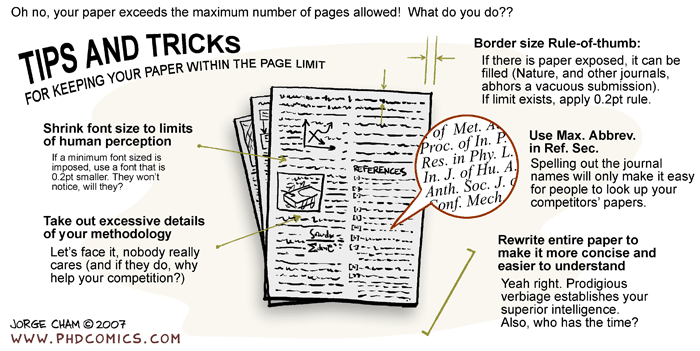

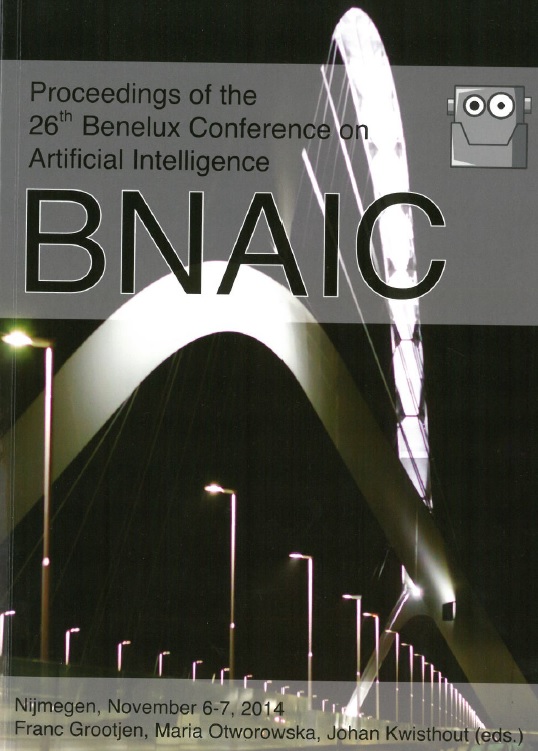
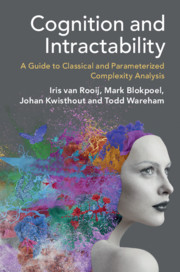
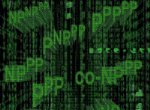
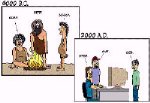


 https://orcid.org/0000-0003-4383-7786
https://orcid.org/0000-0003-4383-7786